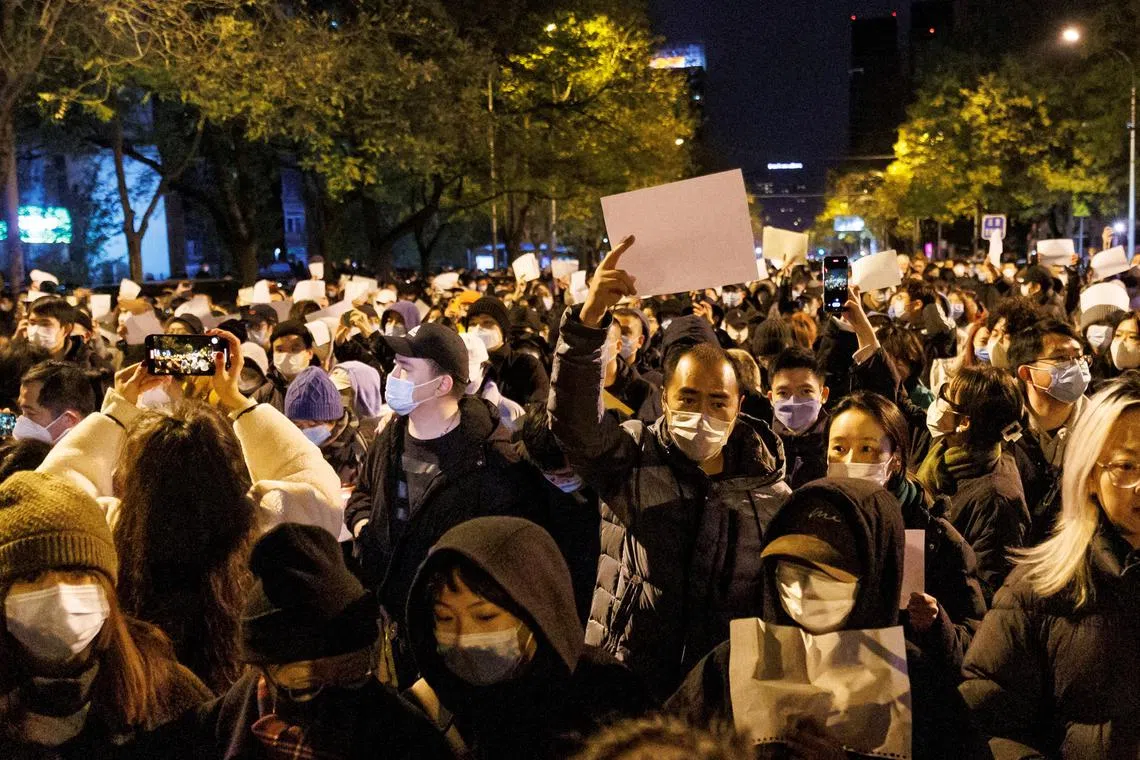Protests against Beijing’s Covid-19 policies should not be curbed: US ambassador to China
Sign up now: Get insights on Asia's fast-moving developments

Demonstrators holding up blank sheets of white paper in protest against Covid-19 restrictions in Beijing on Sunday.
PHOTO: REUTERS
Follow topic:
WASHINGTON - Protests against Beijing’s strict Covid-19 policies should not be interfered with, nor journalists covering the protests detained, United States Ambassador to China Nicholas Burns said on Tuesday.
“We believe the Chinese people have a right to protest peacefully. They have a right to make their views known,” he said via video link from Beijing, at an event organised by think-tank Chicago Council on Global Affairs.
“That’s a fundamental right around the world, it should be, and that right should not be hindered... and it shouldn’t be interfered with,” he added.
His comments come amid other, relatively restrained, remarks that US officials have made regarding the protests in recent days.
US officials have emphasised that the White House supports peaceful protest, instead of explicitly urging China to stop detaining protesters.
“This is a moment for the Chinese people… to speak,” National Security Council spokesman John Kirby said in response to questions on Monday.
“These protesters are speaking for themselves. What we are doing is making it clear that we support the right of peaceful protest.”
However, it is difficult to say whether the protests will lead to meaningful change, said Mr Burns, noting that the protests came at a “very critical time”
“We just have to see how this plays out. It’s obviously a very important event for the people of China. And we’re watching it with great care and great attention,” he said.
The US envoy said that ties between the US and China would continue to be marked by competition for some time, given the deep differences the two superpowers have over human rights, trade, technology export curbs and the Indo-Pacific region.
“We assume that the competitive side of the relationship is going to be with us for quite some time, because of the structural, philosophical, ideological, national security differences,” he said.
Mr Burns also recounted what daily life was like under China’s strict Covid-19 policies, adding that it made the embassy’s work much more difficult.
Like many in China, diplomats have been forced to quarantine at home when entering the country or after exposure to a close contact of an infected person.
Mr Burns said that he had quarantined for 40 days in the nine months he had been in his post.
But severe Covid-19 restrictions have also curtailed US diplomats’ ability to travel between America’s consulates in China and even enter the country.
Monthly flights have to be chartered to bring staff in and out of China, given the scarcity of commercial airline routes into China, he said.
For the last three years, consular staff have also been unable to visit American prisoners in Chinese prisons to check on their welfare.
“The government here has said that for Covid-19 reasons, for precautionary reasons, they won’t let our diplomats into these prisons,” said Mr Burns. “I’ve fundamentally objected to that. We have a right under our 1980 consular agreement to see American prisoners.”
Mr Burns said the Chinese government had reasons for its policies, but added: “Life here is difficult because Covid-19 restrictions are so severe.”
“I don’t want to debate those publicly. I want to be respectful, but… we’re living in a very different way than people in the United States.”

